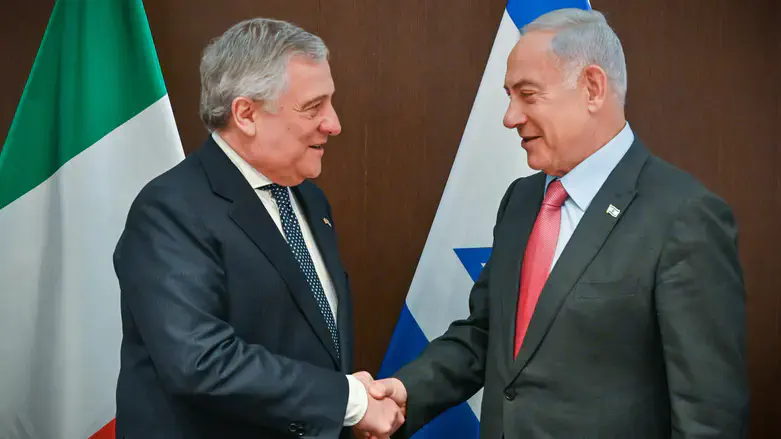
Italy on Tuesday voiced "many doubts" regarding an International Criminal Court (ICC) arrest warrant for Prime Minister Benjamin Netanyahu, emphasizing that it would not be feasible to detain him while he remains in office, Reuters reported.
Italian Foreign Minister Antonio Tajani made the comments after Italy, which currently holds the presidency of the Group of Seven (G7) major democracies, hosted a meeting of foreign ministers.
Tajani sought to establish a unified G7 stance on the ICC warrants against Netanyahu and former Defense Minister Yoav Gallant, but the statement issued after the meeting avoided direct references to the ICC warrants, which also targeted Hamas leaders.
Tajani expressed concerns about the legality of the warrants. He also highlighted the need for clarity on whether high-ranking state officials are protected by immunity, according to Reuters.
"Netanyahu would never go to a country where he can be arrested," Tajani remarked during a press conference at the conclusion of the two-day gathering in Fiuggi, a spa town in Italy. He further stated, "The arrest of Netanyahu is unfeasible, at least as long as he is Prime Minister."
The ICC's actions have created tensions within Italian Prime Minister Giorgia Meloni's coalition government. Defense Minister Guido Crosetto acknowledged that Italy would be obligated to carry out the arrest if Netanyahu entered the country.
However, Matteo Salvini, leader of the League party within the coalition, declared that the Israeli leader would be welcomed in Italy.
In Tuesday’s statement, the G7 urged Israel to "fully comply with its obligations under international law in all circumstances" as it defends itself. The group also emphasized that "there could be no equivalence between the terrorist group Hamas and the State of Israel."
"We reiterate our commitment to International Humanitarian Law and will comply with our respective obligations," said the G7 members, which include Italy, the US, Canada, Japan, Britain, France, and Germany.
The United States, which is not a member of the ICC, has strongly criticized the court's decision.
“The ICC issuance of arrest warrants against Israeli leaders is outrageous. Let me be clear once again: whatever the ICC might imply, there is no equivalence — none — between Israel and Hamas. We will always stand with Israel against threats to its security,” President Joe Biden stated in condemning the ICC decision.
Meanwhile, Reshet Bet radio reported that President-elect Donald Trump's team is already planning punitive measures against the ICC following the decision to issue arrest warrants against Netanyahu and Gallant.
Sources in Washington told the outlet that "the possibility is of imposing personal sanctions not only on the prosecutor or the court - but also on the judges themselves who issued the order." In addition, there are those who argue that the sanctions should also be extended to the family members of those elements in the court responsible for the arrest warrants.
Meanwhile, the European Union’s (EU) outgoing foreign policy chief Josep Borrell told Reuters on Saturday that EU member states cannot selectively decide whether to enforce the ICC arrest warrants.
"The states that signed the Rome convention are obliged to implement the decision of the court. It's not optional," said Borrell.
He emphasized that the same legal obligations extend to nations seeking EU membership. "It would be very funny that the newcomers have an obligation that current members don't fulfill," he added.
